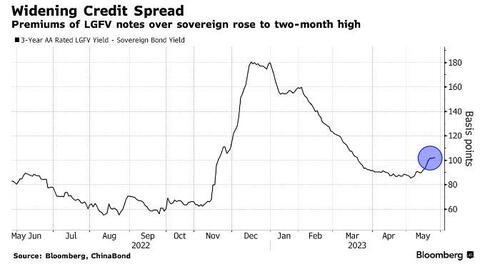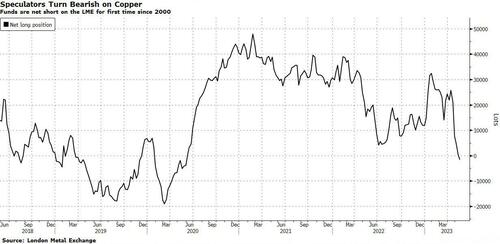Via ZeroHedge, May 28:
By Charlie Zhu, Bloomberg Markets Live reporter and analyst
Three things we learned last week:
1. A town builder’s last-minute bond repayment reignited fears over a potential default by such issuers. Investors are watching out for the first missed payment by a local government financing vehicle, something regional authorities are trying hard to avoid. The possibility has recently increased, as a weakening fiscal situation means authorities are less able to provide support.
Research from GF Securities Co. shows there were 73 cases of shadow-banking defaults in the first four months, already a full-year record since data became available in 2018.
“Missing payments in shadow banking are a signal that debt risks in a certain region have become more prominent,” GF analysts led by Liu Yu wrote in a report.
Yields on Kunming Dianchi Investment Co.’s note due in December surged to over 20% last week, as two holders said they didn’t receive payments until after business hours for a note due this month. Premiums of three-year AA rated LGFV bonds widened to the most since March, and investors cited local-debt worries as one of the reasons behind a decline in Chinese stocks.
China’s LGFVs had 13.5 trillion yuan ($1.9 trillion) of bonds in total outstanding as of end-2022, or almost half of the nation’s non-financial corporate notes, data from Moody’s Investors Service show.
Steps by authorities “to lower LGFV debt risks will not fully resolve long-term issues,” and their refinancing ability depends on investors’ confidence in government support, especially in weaker provinces, Moody’s analysts led by Ivan Chung wrote in a report.
2. With the financial strength of both town builders and their sponsors deteriorating, investors became more pessimistic about China’s demand for raw materials. Copper dived below $8,000 a ton while iron ore breached $100, unwinding gains since Beijing ended its Covid Zero policies late last year.
At the London Metal Exchange’s annual Asian event in Hong Kong, participants reported lackluster activity and said that any market optimism from the National People’s Congress in March had evaporated.
The selloff in Chinese stocks also extended, with the benchmark CSI 300 Index erasing all of its gains for the year. Now, even bulls are rethinking their calls, with Citigroup Inc.’s global allocation team cutting its overweight rating on China to neutral.
3. Luckily, positive developments on China-US bilateral relations helped to alleviate some of the pessimism. Soon after President Joe Biden said he expected ties with China to improve “very shortly”....
....MORE
Yeah.December 14, 2022
China's $3 Trillion Shadow Banking Industry Pivots Away From Property Developers
This is one of the effects of the fact that the huge (eventually multi-trillion yuan) Chinese government effort to stabilize the property sector will not stimulate new construction. With all the implication for commodities that understanding entails.
From Reuters via The Asahi Shimbun, December 12:
Waning trust: China shadow banks pivot away from property to survive
For more than a decade, Chinese developers’ debt-fueled construction boom enriched the country’s shadow banks, who were eager to capitalize on the needs of an industry desperate for credit and too risky for traditional lenders.
Now, in the wake of a government clampdown on real estate firms’ debt binge, that credit demand has collapsed--and so too has the single biggest revenue stream for shadow banks, also known as trust firms.
China’s shadow banking industry--worth about $3 trillion, roughly the size of Britain’s economy--is scrambling for new business, including direct investment in companies, family offices and asset management.
It is also shrinking, with once-well-paid employees leaving for other jobs after scavenging for new deals. The industry’s plight is a sharp contrast to China’s main street financial firms, which the crisis has not yet seriously affected.
“Everyone was eating a mouthful of rice, surviving another day,” said Jason Hao, who left his job this year at a Shanghai trust firm after his pay plunged from as much as 4 million yuan ($570,000) a year to about 240,000 yuan ($34,000).
He is now working at an asset management company....
....MUCH MORE
Related:
What If Our Understanding Of China's "Zero Covid" Is 180 Degrees Wrong?
"China Quietly Launches QE: Beijing Orders Large Insurers To Buy Bonds To Contain Selling Panic"

